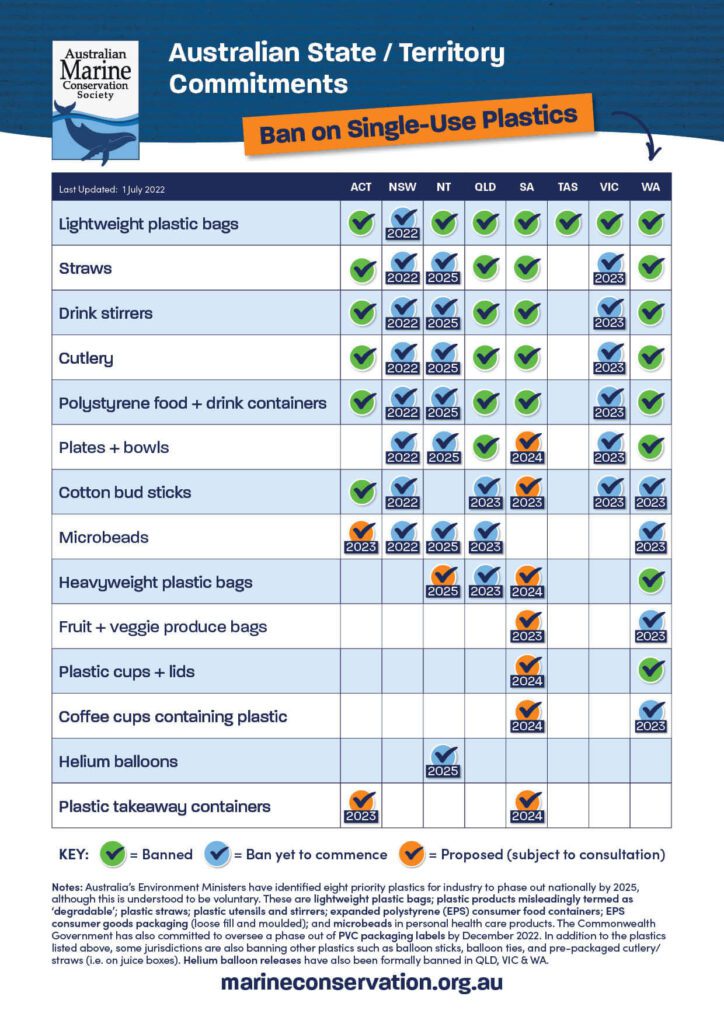Hands up: who loves their coffee?
I know I do. There is rarely a day that goes by that I am not at my local cafe down by the beach with my takeout in hand, and it seems that most of you would have your hands up, given that we spend $3 billion on coffee every year!
That is a lot of coffee (which brings me to another critical point on coffee ground wastage, but we will get to that a little later).
Seven out of eight Australian states and territories have committed to banning single-use plastics. And like the song, Two Out of Three Ain’t Bad, I have to say seven out of eight isn’t either.
You can see which plastics each state has committed to ban and by when in the report card below from our friends at the Australian Marine Conservation Society.

The more plastic we make = the more fossil fuels we need (don’t get me started on that) = the more we amplify climate change. So let’s take a look at what each state has committed to below.
South Australia
The ban on single-use plastics commenced on 1 March 2021, banning single-use plastic straws, drink stirrers and cutlery. On 1 March 2022, polystyrene food & beverage containers as well as oxo-degradable plastics will be added to the ban. Details here. Consultation is currently open on additional plastic items that may be added to the SA ban.
Australian Capital Territory
The ban on single-use plastic cutlery, drink stirrers and polystyrene food and beverage containers commenced 1 July 2021, with straws, cotton bud sticks and degradable plastics phased out on 1 July 2022. Details here.
Queensland
The ban on single-use plastics commenced on 1 September 2021, banning single-use plastic straws, drink stirrers, cutlery, plates, bowls and polystyrene food & beverage containers. On 1 September 2023, the ban will be extended to plastic microbeads, cotton bud sticks, loose fill polystyrene packaging, and the mass release of lighter-than-air balloons. The government has also said they will introduce a reusability standard for carry bags on 1 September 2023, which will in effect ban disposable heavyweight plastic bags. Details here.
New South Wales
The NSW Government has passed laws to ban single-use plastic bags, plastic straws, stirrers, cutlery, plates and bowls, expanded polystyrene food service items, plastic cotton bud sticks, and microbeads in cosmetics. Lightweight plastic bags were phased out on 1 June 2022 and the remaining plastics will be prohibited from 1 November 2022. Details here.
Western Australia
The WA Government has passed laws to ban plastic plates, bowls, cups, cutlery, stirrers, straws, thick plastic bags, polystyrene food containers, and helium balloon releases by 2022. In stage two, now to be completed by 2023, takeaway coffee cups/lids containing plastic, plastic barrier/produce bags, cotton buds with plastic shafts, polystyrene packaging, microbeads and oxo-degradable plastics will be banned. Details here.
Victoria
Victoria‘s Government has committed to ban single-use plastics by February 2023, including single-use plastic straws, cutlery, plates, drink stirrers, polystyrene food and drink containers, and plastic cotton bud sticks. In correspondence with AMCS, the Victorian Department of Environment, Land, Water and Planning has confirmed oxo-degradable plastics will also be included in the ban. Details here.
Northern Territory
The Northern Territory Government has committed to ban single-use plastics by 2025 under the NT Circular Economy Strategy, proposing to ban plastic bags, plastic straws and stirrers, plastic cutlery, plastic bowls and plates, expanded polystyrene (EPS), consumer food containers, microbeads in personal health care products, EPS consumer goods packaging (loose fill and moulded), and helium balloons. This may include heavyweight plastic bags, subject to a consultation process. Details here.
Tasmania has made no commitments to ban single-use plastics.
Reference: Which Australian states are banning single-use plastics? – Australian Marine Conservation Society
With the state of WA alone using up to 190 million single-use coffee cups with lids per year, it might be time to start using that keep-cup now, given that plastic can take up to 450 years to decompose in landfills.
We’ve got your cup covered with some great choices below.
Once you have that new cup, go forth and enjoy that coffee!
And remember how I said we would discuss what happens to coffee grounds? Well you can listen here to our Practical Changemakers podcast interview with Sharka Hornakova about how we can turn our waste into good stuff.
